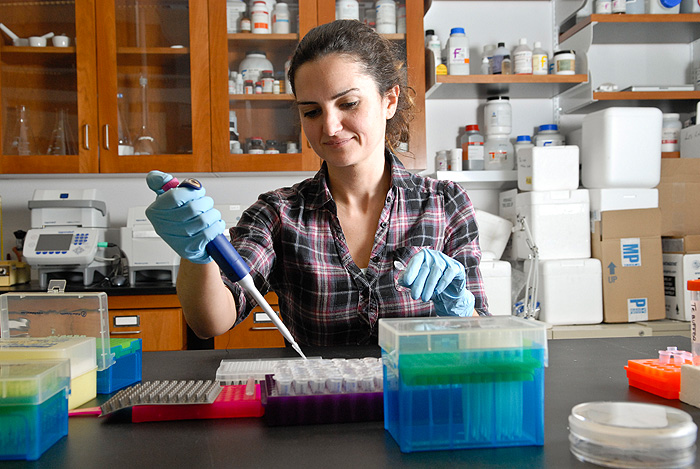A Pakistani academic interested in working with an internationally renowned specialist in her field, a biologist from Spain looking to use state-of-the-art equipment not available at her home institution, and an educator from India who wants to get hands-on experience with people from a different country have all chosen to spend the 2010-2011 academic year at the University of Connecticut under the Fulbright Program.
The three visiting Fulbright scholars UConn is hosting this year are Farah Malik from Pakistan, Elena Lopez Peredo from Spain, and Varsha Gathoo from India.
The Fulbright Program is an international exchange designed to create a mutually beneficial relationship between participant nations. Since its inception in 1946, the program has funded the exchange of more than 300,000 scholars among more than 150 nations. Approximately 800 scholars and professionals from around the world come to the U.S. each year through the Fulbright Scholar program to lecture and carry out research at top U.S. institutions.
Farah Malik is a clinical psychologist specializing in children who hails from Pakistan, where she is a professor and chair of the Department of Psychology at GC University in Lahore. She is currently at UConn on a Fulbright, working with Ron Rohner, professor emeritus and director of the Ronald and Nancy Rohner Center for the Study of Interpersonal Acceptance and Rejection in the Department of Human Development and Family Studies.
“I came to UConn because I wanted to work with an expert in the field of family relationships, particularly parental acceptance-rejection”, says Malik. “Professor Rohner was very welcoming when I shared my project with him, and it is a great honor for me to collaborate with an internationally renowned scholar like Rohner who has made a tremendous contribution in the field of psychology while posing a new theory on acceptance-rejection for which he is also honored by the APA.”
Malik says that having been selected for the Fulbright Award is a great honor. “This wonderful exposure to U.S. society and families might be helpful for me to take a message of friendship, warmth, and acceptance back home that might help in bridging the gap between the people of the two countries.”
Her cross-cultural study, focusing on both U.S. families and Pakistani families, could have policy and practice implications not only for her homeland but also for families in the U.S. and in other countries as well.
“Farah benefits by getting trained in parental acceptance-rejection theory,” says Rohner. “We benefit, personally and professionally, from the stimulation of sharing ideas and data with scholars from around the world.”

Elena Lopez Peredo is a biologist specializing in plant genetics. Peredo, who holds a Ph.D. in biology from the University of Oviedo in northern Spain, is working with Professor Don Les from the Department of Ecology and Evolutionary Biology.
The project she is working on here is a new area for her. Whereas her prior research was on hops – the aromatic flowers used to brew and flavor beer – her current research focuses on an aquatic plant: the genus Najas.
“This switch in research focus is allowing me to take bigger risks than I’d otherwise be able to take,” she says. “I’m taking what I already know and applying it to a different field in new and exciting ways, which is allowing me to grow as a researcher. And that’s really the big goal of the Fulbright program: to gain experience and to do things that would be difficult for you to do in your own country.”
By pairing up academics from foreign universities with academics in the United States, the Fulbright program promotes a mutually beneficial scholarly exchange. Visiting scholars benefit from their host universities by working with specialists and with equipment that may not be available in their home countries.
“We provide office space, and access to lab facilities and equipment,” says Les. “We give them what they need to work.”
But the host institutions also benefit by hosting scholars from overseas. Host faculty and visiting faculty pick each other’s brains for new information and new ideas, says Les, and this exchange of information allows both programs to advance. Differing expertise helps researchers develop new methods by applying techniques from one field to another.
“This exchange takes a good project and makes it all that much better,” says Les. “[Elena’s visit] is the best thing that’s happened to my project in a long time. To get someone as skilled as Elena in our lab, to use her expertise – it’s just amazing. I love Fulbright. I’m a life member of Fulbright.”
Varsha Gathoo is a senior research Fulbright Scholar from the University of Mumbai, India, where she is head of the Department of Education. A specialist in the field of disability and deaf education, Gathoo is working with Professor Mary Beth Bruder, director of the A.J. Pappanikou Center of Excellence in Developmental Disabilities at UConn.
In addition to hosting these three visiting scholars, UConn currently has six faculty members abroad with Fulbright Scholar grants, two with Fulbright-Hays Faculty Research Abroad grants, and two with Fulbright Specialist grants.


